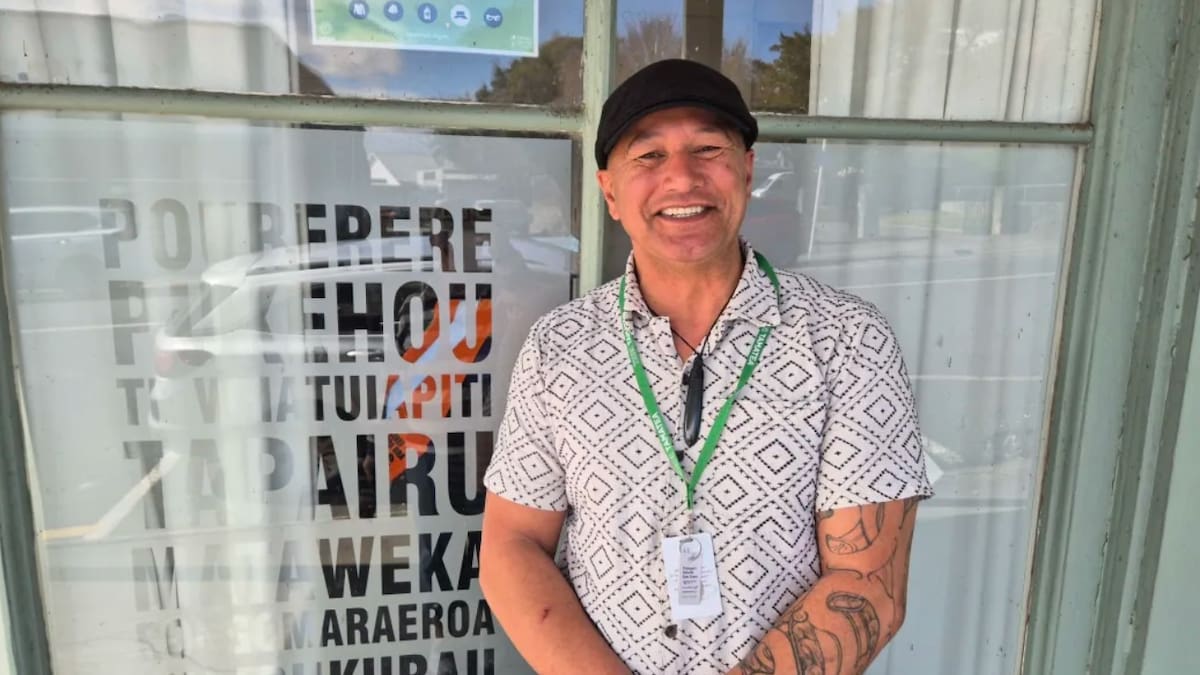With a warm smile and a welcoming hug, Thompson radiates positivity. It’s this optimism that was helping get people’s lives back on track.
“I’ve always been a good believer in helping people into self-motivation, to inspire them into you can do it.
“That’s all it is, is korero with people about that ‘can do’ attitude,” he said.
The number of people living on a benefit in Central Hawke’s Bay is the highest it’s been in more than 12 years as residents struggle to find work in a tough job market.
Thompson works for Te Taiwhenua O Tamatea and does the employment placements and pastoral care for the Ministry of Social Development.
Many hours were spent on the road, visiting people in their homes to see what challenges they were facing with finding a job and helping in any way he could.
One of his clients, 19-year-old Caleb Watene, had been searching for work for over eight months.
“It’s just about letting him know there is someone there in his corner,” said Thompson.
Watene lived in Waipawa and was on the jobseeker benefit, which was how he had ended up with Thompson’s help.
Caleb Watene has been hunting for work for more than eight months and says it is a tiring and stressful process. Photo / Alexa Cook, RNZ
“It gives me more hope really and makes it easier for me to get a job,” Watene said.
Because in the never-ending grind of searching for work, applying for jobs and being rejected it was easy to lose hope.
“It’s tiring and stressful and makes you scared a bit. I could end up in a position where we have to go back living with our parents,” he said.
It was the longest he’d been out of a job since he began working at age 14 and he told RNZ that living off a benefit was hard when the cost of living was so high. Each week he had $30 left after paying for rent, power and groceries.
“It’s pretty hard at the moment… it’s harder than it used to be, way harder. Before I went to Aussie, I could crack a job just like that,” he said.
The main employment opportunities in Central Hawke’s Bay were the freezing works, a pet food company, farming or seasonal orchard work.
However, with recent restructures and businesses closing there were 11% fewer jobs being advertised in Hawke’s Bay than a year ago. Thompson was seeing it first-hand.
“In the year that I’ve been here it’s steadily rising, the unemployment out there. It’s tough times for everybody,” he said.
Combine that with the rising cost of living and Thompson is concerned about his community.
“I worry about it all the time… you know I sit there and look around and think sometimes we are like the poor cousins in Hawke’s Bay because you’ve got Hastings and Napier and all of that.”
Watene said he felt disheartened by the Government, saying it was not delivering on promises to boost the economy and employment.
“It is a real struggle. I’m not happy with the Government at the moment. I’m pretty annoyed as [the Government is] making our lives harder, that’s how I feel,” he said.
Social Development Minister Louise Upston told RNZ that unemployment was one of the last things to come right after a recession.
“Under our Government, inflation is down from 7% to 2.5%, interest rates are falling, wages are growing faster than inflation, rents have flatlined and we have put a lid on Government debt, which blew out by $120 billion in recent years,” she said.
Social Development Minister Louise Upston says unemployment is one of the last things to come right after a recession. Photo / Michael Craig
The minister said infrastructure investment would create more jobs, and this year’s Budget forecast economic growth to average 2.7% per year, creating 240,000 jobs.
She said there had been a 14% increase in job seekers leaving the benefit compared to a year ago.
That’s something Watene would love to do, but he told RNZ it was not as easy as the Government made it seem.
“They think there are jobs out there that we can just get with a snap of our fingers, but it doesn’t work like that for us. I need work asap and I’ve been looking every day.
“It’s hard times and I feel the Government focuses on other stuff rather than what’s really important, which is people,” said Watene.
In his role, Thompson could also help people into further training at EIT, the Eastern Institute of Technology, if a career change or up-skilling was needed.
Although some skills did not require tertiary education and he often mentored jobseekers on the importance of a good handshake and eye contact.
“Those tiny skills go a long way. I think sometimes that the social development of people has gone a bit wayward with the increase in social media and technology,” laughed Thompson.
He’s a big fan of the old-school approach, driving his clients to meet potential employers face to face and drop off a copy of their CV.
“It’s easy to send an email where they can just flick it off, but go there in person and introduce yourself… it just shows you’ve got commitment,” he said.
It’s often a successful tactic, and he told RNZ that when people finally secured a job it was a real highlight.
“I feel rapt for them. It’s helping to improve their life and their whānau’s life.
“Just seeing the pressure come off their face… because you do get a lot of clients who do walk in and have their head down,” he said.
– RNZ

